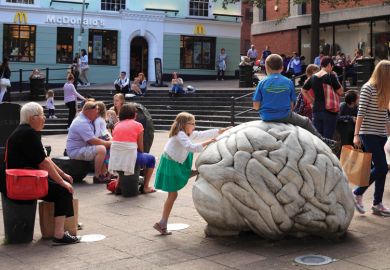The strongest predictor of academic achievement by far is a student’s intelligence. Compelling empirical evidence shows that this is true even after the effects of family wealth and school quality are removed. Nonetheless, the word “intelligence” is absent in virtually every discussion of our decades-long failure to improve test scores and close academic achievement gaps among poor and minority students.
If you object to the concept of “intelligence”, think instead about reasoning and problem-solving ability. They are, in essence, the same thing. Advances in neuroscience research leave no reasonable doubt that brain characteristics are related to intelligence differences among individuals, and that genes play a major role in how these differences develop.
You might not think so, but these are positive and optimistic findings, with potential implications for ameliorating achievement gaps. Genes turn on and off throughout life, and the various triggers for this ebb and flow of neurobiological events are targets of intensive worldwide research.
The good news is that once genes that contribute to intelligence are identified, research can determine how they influence brain mechanisms and how other factors, including environmental ones, influence their expression. Research offers the promise of changing negative genetic influences related to diseases into positive ones for treatments and cures.
A similar potential exists for influencing academic achievement by understanding the neurobiological basis of intelligence. Talking to babies and reading to children in the first months and years of life, for example, are wonderful suggestions based on neuroscience research about the developing brain, but they are only glimpses of what might be feasible once we have a better understanding of how genes shape brain development. Consider the possibility of increasing a student’s intelligence based on understanding the cascade of neurobiological events that contribute to brain characteristics necessary for good reasoning and problem-solving ability.
This research may be particularly beneficial for people with relatively low levels of intellectual ability. Approximately 51 million Americans and 10 million Britons have IQ scores of 85 or lower, including about 13 million children in the US and 1.8 million in the UK. (The average IQ is set at 100; an IQ of 85 is at the 16th percentile.) For them, through no fault of their own, lower reasoning ability is a profound limitation that most of us can scarcely imagine. It does not mean less personal integrity, less love and care for others, or poor motivation for hard work and a meaningful, dignified life. It is, however, likely to be a major factor underlying chronic underemployment, education achievement gaps and even poor health. To the extent that the brain and genetics are demonstrably involved, neuroscience has the remarkable potential to help remediation efforts.
So far, there is no proven way to increase intelligence, but the tools of neuroscience are powerful. In the long run, properly funded neuroscience research might be the most efficacious route for dramatic reductions in frustratingly persistent achievement gaps. We should embrace and pursue the possibilities rather than ignore or fear them.
Historically, assaults on intelligence research were launched as a reaction to studies that suggested that average intelligence test scores were lower for some disadvantaged and minority groups. Combined with the possibility that intelligence might be genetically determined, this incendiary combination resulted in efforts to discredit the validity of intelligence tests and genetic studies. Concurrently, there was a single-minded focus on environmental factors as the predominant, if not only, influence on differences in mental abilities and the cause of achievement gaps.
This has led to 50 years of earnest and expensive but largely futile attempts to reduce education achievement gaps. These include focuses on early childhood education, raising students’ expectations, smaller classes, better teacher training, more testing and greater accessibility of challenging classes. Such interventions should not be expected to reduce gaps appreciably given the consistent research that shows that such variables do not influence academic achievement all that much – especially compared with the large effect of a student’s intelligence.
Education is for individuals. It does not matter if there are average intelligence differences among groups defined by poverty or race because there is more overlap than separation. As in modern medicine, any genetic influences, although real, are best thought about as probabilistic rather than deterministic. Basic neurobiology is the same for all humans, and both genetic and neuroimaging research connects neurobiology to intelligence. Understanding the complexities of how this works has potential for designing ways to improve mental ability and maximise education for all students, irrespective of background.
No one is well served by education reforms that neglect research findings on the nature of intelligence and its central role in student achievement. Neuroscience and intelligence research cannot solve all the issues of failing schools and education, but it is time to follow the data and add what we know from these perspectives to discussions about what research to fund, and what reforms to try next.
Richard J. Haier is professor emeritus in the School of Medicine at the University of California, Irvine and is editor-in-chief of the journal Intelligence. His latest book, The Neuroscience of Intelligence, is published by Cambridge University Press on 6 April.
POSTSCRIPT:
Print headline: Achievement gap can only be closed if we embrace neuroscience
Register to continue
Why register?
- Registration is free and only takes a moment
- Once registered, you can read 3 articles a month
- Sign up for our newsletter
Subscribe
Or subscribe for unlimited access to:
- Unlimited access to news, views, insights & reviews
- Digital editions
- Digital access to THE’s university and college rankings analysis
Already registered or a current subscriber?







